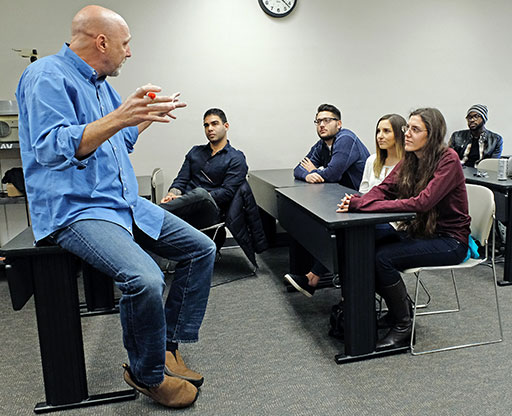Live curiously. Think rationally.
Philosophy is a discipline that encourages participants to think, question and wonder. Studying philosophy also offers practical payoffs because the skills taught (including an emphasis on analysis, argumentation, evaluation and proof) carry over to many endeavors. Philosophy encourages logical precision, awareness of the assumptions underlying any discussion and an attitude of both open-mindedness and responsible criticism toward new and unusual ideas.
Accelerated Program
The accelerated program is a unique dual degree program that provides a pathway for students to earn both a bachelor’s and a master’s degree in Philosophy with fewer total credit hours than would be required to complete each degree independently. Once all requirements have been met, students will be awarded both a BA and an MA and are able to enter the job market with a competitive edge.
Program type:
Major, BA
Format:
On-Campus, 100% Online
Take the next step

Bachelor of Arts in -
Philosophy
The BA in Philosophy is designed for students with an interest in expanding their thought process. Studying philosophy makes you more open-minded: you’ll encounter the ideas of people who have lived lives very different from yours. Undergraduate philosophy majors are well prepared to generate higher scores on standardized tests (like the LSAT, GMAT and GRE) than many of their non-philosophy classmates. Employers in many fields actively seek out and welcome philosophy graduates because of the diversity and proficiency of their skills. A BA in Philosophy prepares students well for careers requiring advanced study including law, medicine and academia.
Outcomes and Career Outlook
Upon completion of the program, graduates will be able to recall a broad range of philosophers and philosophies and understand their interrelations and historical significance; demonstrate an ability to read and critically engage with historical and contemporary philosophical texts; reconstruct and deliberate over philosophical arguments; understand fundamental moral theories and apply them to ethical problems and practical pursuits; demonstrate formal reasoning tools and apply those tools in philosophical and everyday contexts; apply philosophical concepts, analytical skills and critical thinking outside of philosophy; create and defend their own philosophical views orally and in writing; and apply research skills.
The median annual salary for philosophy graduates is $60,000, according to wage and employment data from U.S. Bureau of Labor Statistics.
60,000
Career Opportunities
- Advertising
- Civil Service
- Consulting
- Ethics
- Higher Education
- Human Resources
- Journalism
- Law
- Market Research
- Medicine
- Policy Analysis
- Social Work
- Technology/Artificial Intelligence
- Writer
Plan of study
Review Full Degree Requirements Review Sample Four-Year Plan
Non-Missouri Residents: Prospective students are responsible for reviewing the UMSL state authorizations page to see if this program is offered in their state throughout their program and to review the licensure or certification requirements for the state in which they reside.
Student organizations
Make new friends and learn new skills by joining one of our Recognized Student Organizations. Here are several opportunities you may be interested in as a philosophy major:
- Philosopher's Forum
- Phi Sigma Tau - International Honor Society in Philosophy
- Student Government Association
- Students of the University of Missouri
Honors College
The UMSL Honors College is a certificate program that can be paired with any major without adding extra classes or extending time to graduate. Classes in the Honors College are seminar-style, meaning that they are based in reading, writing, discussion, and critical thinking. This unique class format fosters an intellectual climate centered around democracy, civility and academic excellence.
Undergraduate research
We encourage and support students as they engage in exciting activities in and outside of the classroom that enrich their academic and professional understanding of their chosen area of study. All majors are encouraged to participate in Undergraduate Research and Scholarship to produce discipline-specific intellectual or creative innovations to their field.








